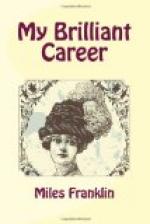I say naught against the lower life. The peasantry are the bulwarks of every nation. The life of a peasant is, to a peasant who is a peasant with a peasant’s soul, when times are good and when seasons smile, a grand life. It is honest, clean, and wholesome. But the life of a peasant to me is purgatory. Those around me worked from morning till night and then enjoyed their well-earned sleep. They had but two states of existence—work and sleep.
There was a third part in me which cried out to be fed. I longed for the arts. Music was a passion with me. I borrowed every book in the neighbourhood and stole hours from rest to read them. This told upon me and made my physical burdens harder for me than for other children of my years around me. That third was the strongest part of me. In it I lived a dream-life with writers, artists, and musicians. Hope, sweet, cruel, delusive Hope, whispered in my ear that life was long with much by and by, and in that by and by my dream-life would be real. So on I went with that gleaming lake in the distance beckoning me to come and sail on its silver waters, and Inexperience, conceited, blind Inexperience, failing to show the impassable pit between it and me.
To return to the dairying.
Old and young alike we earned our scant livelihood by the heavy sweat of our brows. Still, we did gain an honest living. We were not ashamed to look day in the face, and fought our way against all odds with the stubborn independence of our British ancestors. But when 1894 went out without rain, and ’95, hot, dry, pitiless ’95, succeeded it, there came a time when it was impossible to make a living.
The scorching furnace-breath winds shrivelled every blade of grass, dust and the moan of starving stock filled the air, vegetables became a thing of the past. The calves I had reared died one by one, and the cows followed in their footsteps.
I had left school then, and my mother and father and I spent the days in lifting our cows. When our strength proved inadequate, the help of neighbours had to be called in, and father would give his services in return. Only a few of our more well-to-do neighbours had been able to send their stock away, or had any better place to which to transfer them. The majority of them were in as tight a plight as ourselves. This cow-lifting became quite a trade, the whole day being spent in it and in discussing the bad prospect ahead if the drought continued.
Many an extra line of care furrowed the brows of the disheartened bushmen then. Not only was their living taken from them by the drought, but there is nothing more heartrending than to have poor beasts, especially dairy cows, so familiar, valued, and loved, pleading for food day after day in their piteous dumb way when one has it not to give.




